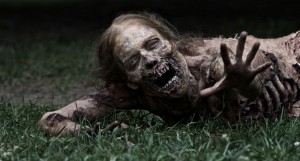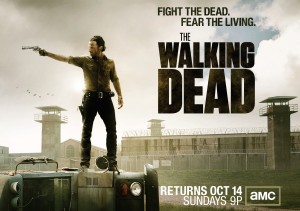
As one of the biggest pop culture phenomena of the decade, it is hard to argue with the statement that zombies are everywhere. From cult classics like 28 Days Later and Dawn of the Dead, to comedic satires like Shaun of the Dead, and the recently released Warm Bodies, it would only stand to reason that the small screen would soon adapt the genre to an ongoing dramatic series. The Walking Dead, based on the graphic novel series of the same name, is Hollywood’s attempt at feeding our culture’s insatiable hunger for all things gruesome, twisted, and undead.
When the series began two and a half years ago, the story had observable momentum and strength. The first episode was almost seductively powerful as it followed the hero, Rick Grimes, who woke up from a coma to a post-apocalyptic Georgia after “the outbreak.”
The audience is just as mystified as Rick as they watch him exit the abandoned hospital he has found himself in and walk through rows of bodies laid out across the ground. As the camera pans out, viewers soon realizes the true enormity of the situation when the rows of bodies become fields upon fields of them, covered in white sheets and completely covering the town he once called home.
As he tries to make sense of these shocking surroundings, he happens across his first zombie, or “walker,” as they are later coined. This female zombie is missing everything below her belly button, and thus can only snarl at Rick as he passes, reaching out with graying and rotting hands toward sustenance.
The episode continues with a bewildered Rick finding his home deserted and in shambles, his wife and son nowhere to be found. A man and his son then take him in while he recuperates, and this is where more of the situation is explained to him. The man points out his wife who “turned” as she aimlessly walks the streets with the rest of the undead, and explains that he cannot bring himself to kill her.
After acquiring guns and ammo, he decides to head to Atlanta in search of his family. Before the episode ends, we see him find that first zombie woman, look her square in the face as she snarls and thrashes at him, and puts her out of her undead misery with a bullet in the brain. These incredible and haunting sequences formulated an immediately dark and powerful tone for the show, and were an undeniable factor in its success.

With only six episodes, the first season was short but powerful. In fact, I would argue that the one and a half seasons to follow still have not lived up to brilliance of the first. The second season was stagnant, with story arcs that lasted for six or seven episodes that could have been better told in just one or two. The characters were so underdeveloped and their motives so unclear that I often found myself annoyed with them. With a few exceptions, particularly the mid-season and season finales, the second season as a whole was underwhelming.
The third season, while still problematic in some areas (particularly in regards to character development), has finally begun to rectify many of its second season faults. With the introduction of a new villain, the Governor, and a few other new characters like the ninja-sword-wielding-and-pet-zombie-toting Michonne (you would need to see it to really understand just who, or rather what, she is), and with only a few dry plotlines, the forecast of the series as a whole is finally looking bright.
Despite its faults, this show manages to harness a genre that, more often than not, has been difficult to take seriously. Somehow it manages to deliver a convincing and terrifying apocalypse as a result of a completely unrealistic situation. While doing this, it still manages to explore deep ideas and problems, like the complexities of the human condition, the struggle to hold onto hope in a hopeless world, the inherent value of life and how the destruction of the social institution as we know it can change that, and the simple question of the importance of interactive human relationships. The formal artistic attention to cinematography, the very serious subtext, and the mere excitement of a horror series are all reasons to look past the show’s definite shortcomings and to tune in every Sunday evening at nine on AMC.
